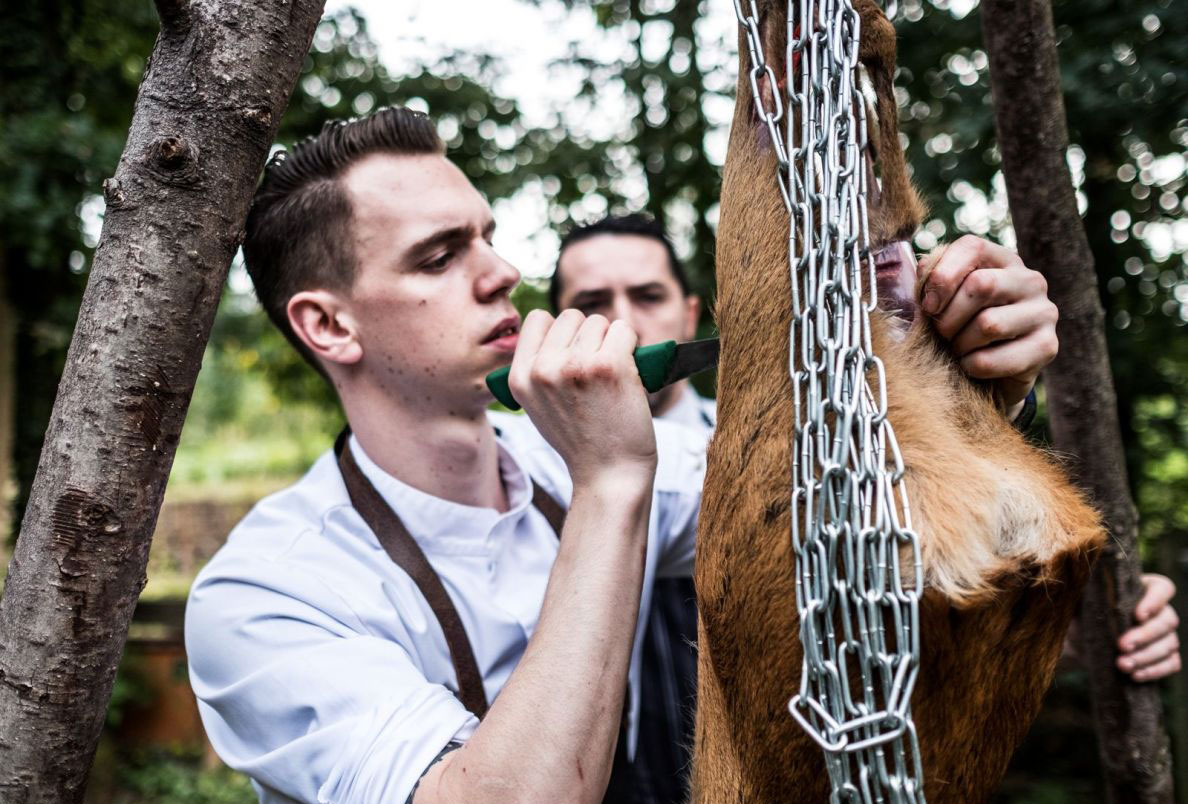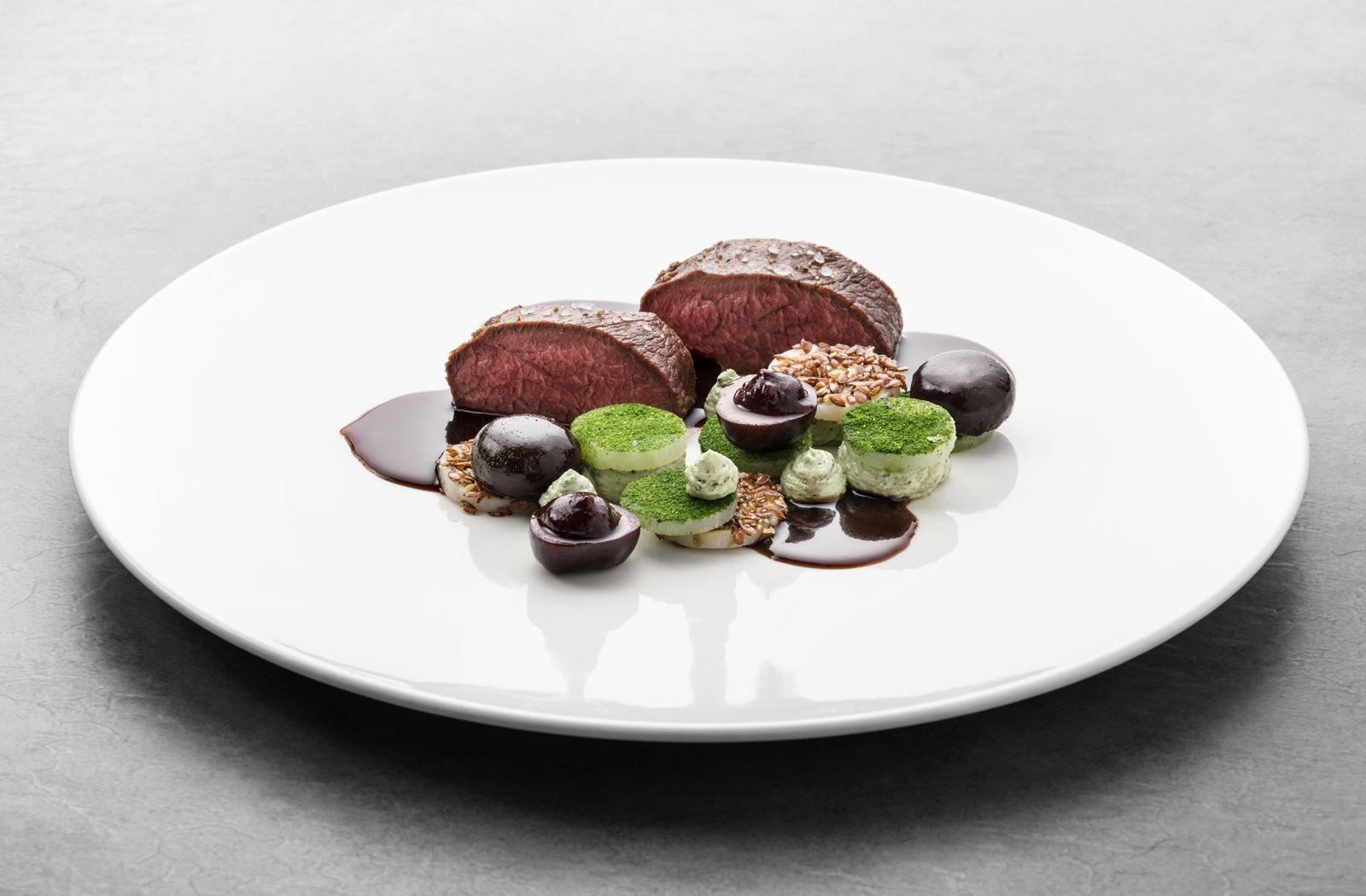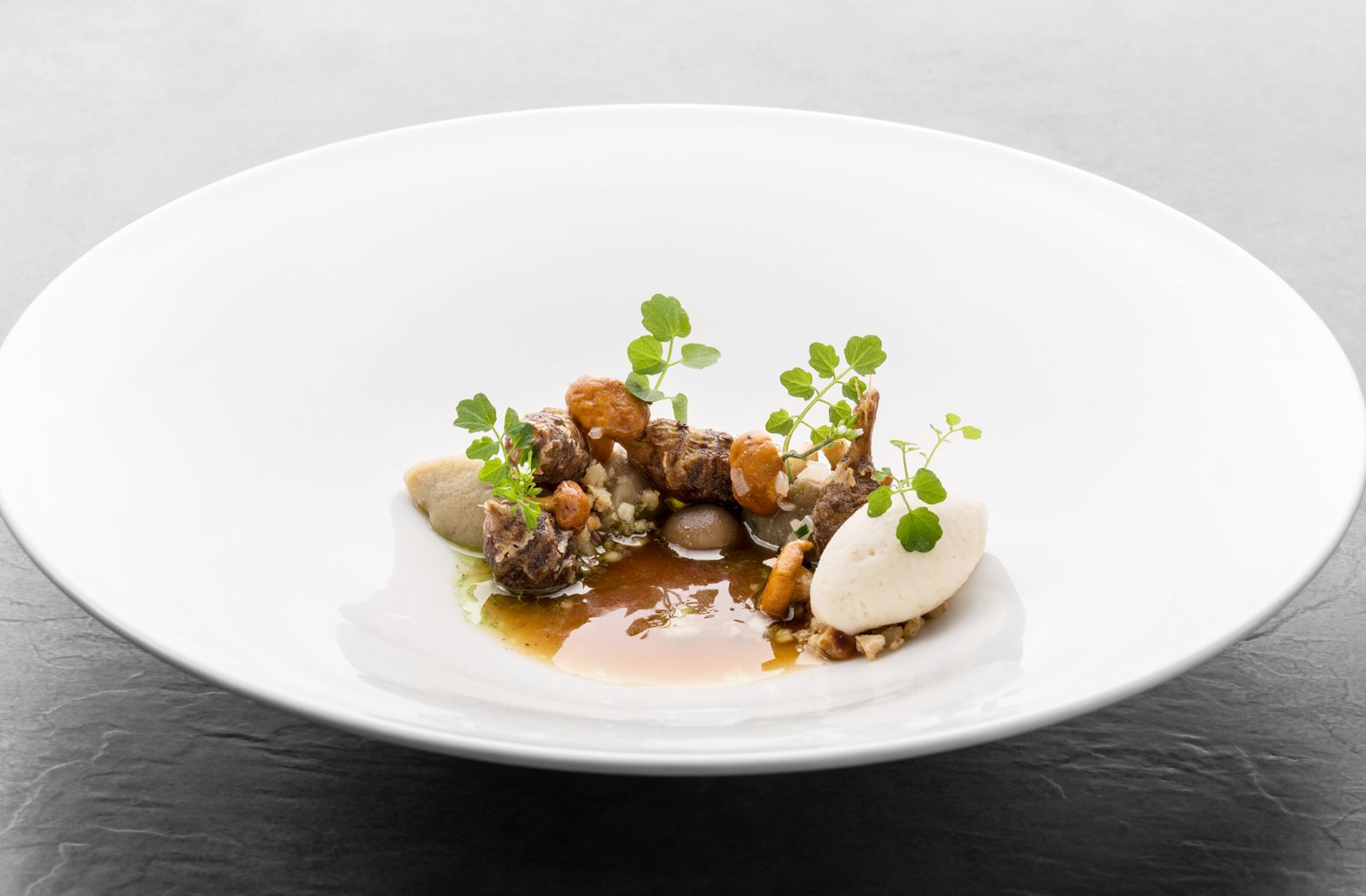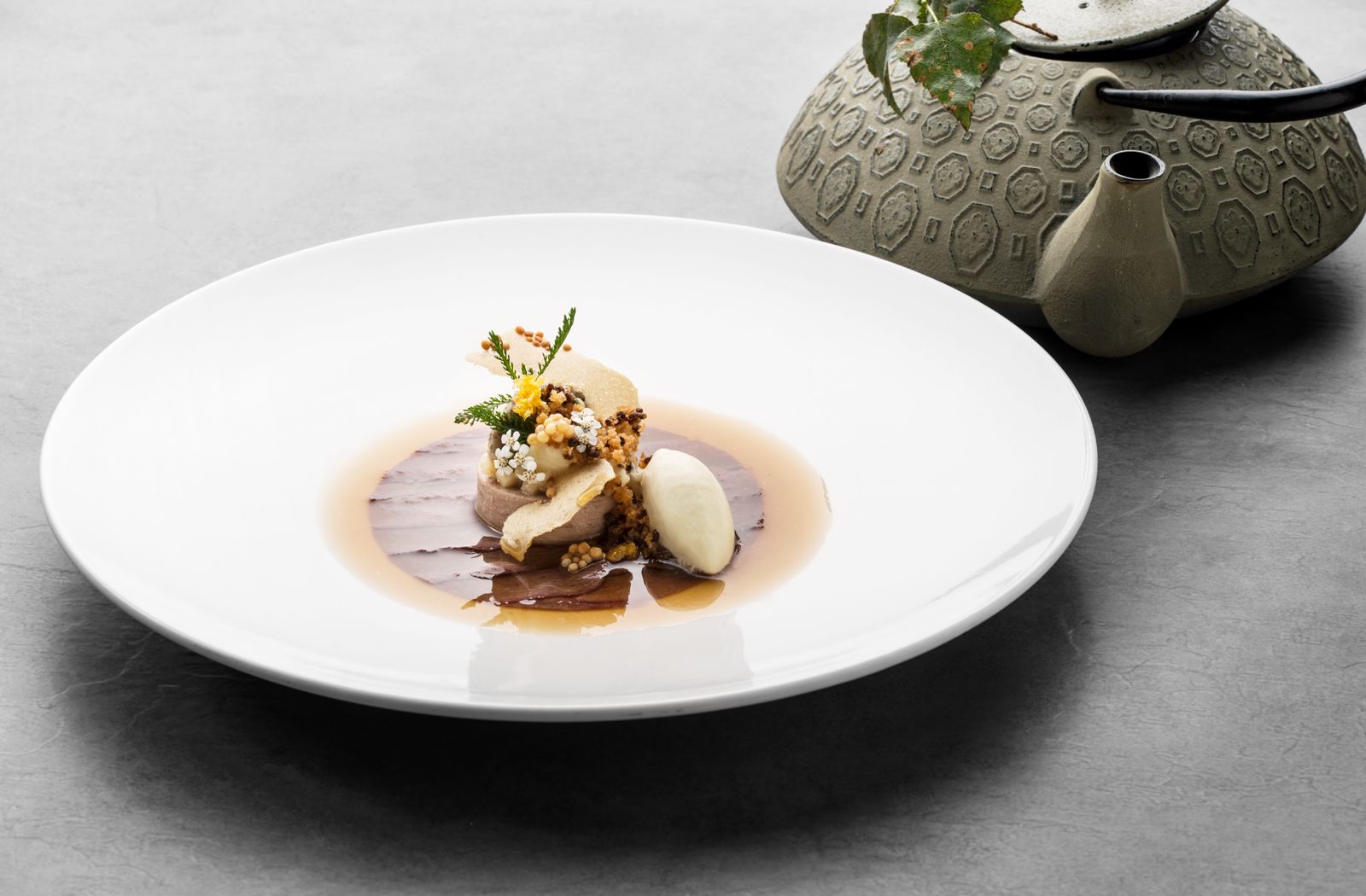Interview Bjorn Massop
As a chef de cuisine at Basiliek and executive chef at De Echoput he worked, as he puts it, ‘for big, big names’. Now, at Villa Ruimzicht, he himself is in the spotlight. Fortunately, our hero Bjorn Massop has very clear aspirations. He wants to work with great ingredients like game. He wants to grow his own herbs and vegetables. And more than anything, he wants to raise the craft of cooking to an art form. Read the full interview below.
“Game means more than just meat”
For this edition of IAMCHEF Magazine, we went looking for a young, ambitious chef with a passion for game. We found him in the person of Bjorn Massop at Villa Ruimzicht in the town of Doetinchem. You know you’re in the right place when, arriving for the interview, you spy a whole, unskinned deer hanging from the outdoor rafters.
Bjorn Massop’s culinary career has been a colorful one, including a stint at De Zwethheul (two Michelin stars), near Rotterdam. Rather than staying there – which would have been great for his resume – he made the move to the much smaller Jachthuis restaurant in the town of Hoog Soeren. But why? Because he could learn new facets of his profession there, such as boning game. He then moved on to another Michelin-starred restaurant, Basiliek in Harderwijk, where he was a sous-chef and then chef de cuisine. A few years later, he made the switch to a role as executive chef at Peter Klosse’s famous game restaurant, De Echoput. He started on a new adventure in the spring of 2017: Hotel Villa Ruimzicht in Doetinchem, where he decided to shake things up in the kitchen.

"Game is on the menu everywhere you have worked. What is the appeal?"
“I was eighteen when I joined the staff at Het Jachthuis in Hoog Soeren. That was the spark that ignited my passion for game. Fresh game – entire animals – were regularly brought in, and we could really get to work. It’s the most beautiful, most natural meat there is. Wild animals feed on whatever they want and need. To me, game is more than just meat, by the way. Nature provides us with so many fantastic herbs and other products. Sometimes the simplest things are the best. For example, I used a tea of birch leaves in one of the dishes I prepared for this interview today. It has an incredibly beautiful, subtle taste.”
Much of what you are showing us today emphasizes craftsmanship. What is your take on that?
“In my Jachthuis days, early in my career, I quickly became accustomed to working with whole animals – skinning them, boning them. That is the true essence of my profession, I feel. It’s a really important aspect of being a chef. It was part of my early training. I don’t think aspiring young chefs learn these skills anymore. I have young men in my kitchen with all sorts of certificates and qualifications, yet who are novices when it comes to cutting and slicing. We do as much as we can ourselves here. Several times a year, I try to get a deer or some unskinned hares in. That really brings home what it means to work with meat. You can feel the animal, that was once a living, breathing creature. I’m serious, regardless of your particular cuisine, bring in a whole fish from time to time. Let these young guys clean a fish thoroughly – descale it, gut it, debone it. Teach them what our profession means. We can’t let that disappear.”
How important is awareness to you?
“For me, it’s all about sustainability, nutrition, and health. I’ve spent countless hours studying these aspects of my profession. The challenge is to bring those components together in an integrated whole. For example, as a hotel we also serve breakfast to our guests. That means we have a lot of bread leftover every day. We could throw it out, but instead we use it in the preparation of our bouillons. If we slice off something edible, no matter what it is, we always look at how we can use it. I don’t want to throw anything away. That’s a cardinal rule in my kitchen. It requires an attitude adjustment, but for me it’s the only way. Of course, the easiest thing in the world is just to toss scraps into the trash, but that’s such a waste. I really feel that training young chefs to adopt the right mentality is key. As professionals, we have a duty to teach people that there is more to food than just taste and presentation... food and sustainability can and should go hand in hand.”
Going above and beyond the call... does that mean working harder and for longer hours?
“Attitudes are changing, I can sense it. I think it’s important that people work the hours they’re contracted for. That means you have to adopt a different perspective on the workings of the kitchen. You have to give careful thought to everything you do – or don’t do. How many steps does it take to get to the final plating? There’s no sense in inventing dishes or devising steps that are simply not feasible.
My own attitudes are changing, too. Certain aspects of preparation and presentation that I once admired, I now find questionable. Where’s the added value? I give far more thought to flavors and structures these days. In a nutshell, we leave out anything that is not strictly necessary. This means we can keep quality high while working efficiently.”
Why did you go to work for a hotel and restaurant rather than starting your own business?
“I love a challenge. As soon as things are running totally smoothly, I want more. I’d go completely nuts just stirring pots five days a week. I like the hubbub and action of the entire business... not just a restaurant, but a more comprehensive organization. One that requires broad perspectives. I get a kick out of turning the seemingly impossible into reality. On the other hand, I spent years working in the shadow of other chefs, so for me this adventure is something of a blank page. I’ve got a chance to show the world what I’m made of, how I see things. It’s not easy, but it’s a lot of fun.”
How do CHEF products fit into your story?
“Taking my background into consideration, I mostly work with CHEF Natural Fonds. We were just speaking about efficiency in the kitchen, and this is a great way to save time. To be honest, if I have to braise large quantities of meat for a banquet, then it’s really inefficient to make the veal stock myself. I’d much rather use a fully natural stock for simmering. The right product at the right time. There is a clear line of thought, a common thread, running through everything I do. A sense of how things should be. But efficiency is paramount.”
How did you go about selecting local suppliers?
“I love a challenge. As soon as things are running totally smoothly, I want more. I’d go completely nuts just stirring pots five days a week. I like the hubbub and action of the entire business... not just a restaurant, but a more comprehensive organization. One that requires broad perspectives. I get a kick out of turning the seemingly impossible into reality. On the other hand, I spent years working in the shadow of other chefs, so for me this adventure is something of a blank page. I’ve got a chance to show the world what I’m made of, how I see things. It’s not easy, but it’s a lot of fun.”
This region is very important to you. Why are you so fond of it?
“When I worked in the Veluwe region, I really fell in love with the area and I learned everything I could about it. I wanted to dig around to see how I could incorporate that special feeling in my dishes. At some point, I realized that the Veluwe and Achterhoek regions are really quite similar: both feature beautiful landscapes that produce all sorts of fantastic, local ingredients. Then I thought: why not put the same things into practice here? That’s when the Villa entered the picture.”
What are your plans for Villa Ruimzicht?
“Just this morning, we started on the fields near the cloisters. People on a sheltered employment program spend their days there tending the vegetable garden. Unfortunately, they will have to find some new acreage, because the cloisters have a meditation center, and that doesn’t mix well with the noisy farm equipment. We’ve got a couple of dozen acres next to our villa. We want to cultivate that land and start growing our own vegetables next summer. We’ll start small, but we have big plans.”
That sounds ambitious. Why create all this extra work for yourself?
“What amazed me most when I started working in the restaurant trade, is that we used produce that my parents hadn’t even planted yet in their vegetable garden. I always wondered why we did that, because it just felt weird and somehow unnatural. What I want more than anything is to convey my own experience of eating what’s in season. And when it comes to challenges, I just get a kick out of turning the seemingly impossible into reality. So if ten people tell me something can’t be done, I want to prove them wrong. That’s the kind of challenge I live for.”


